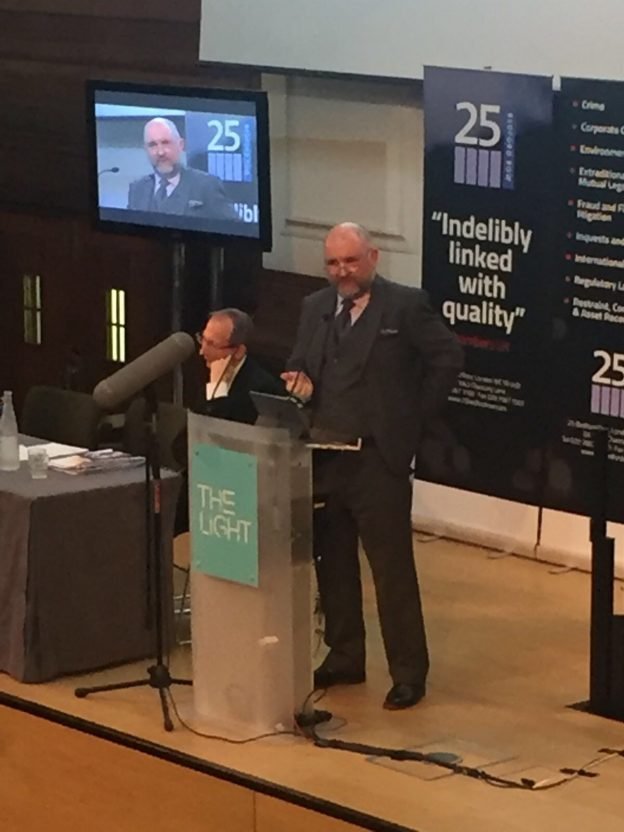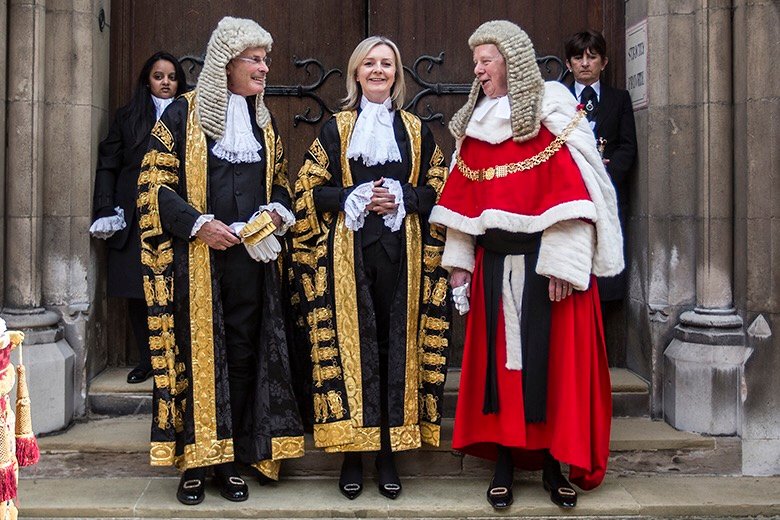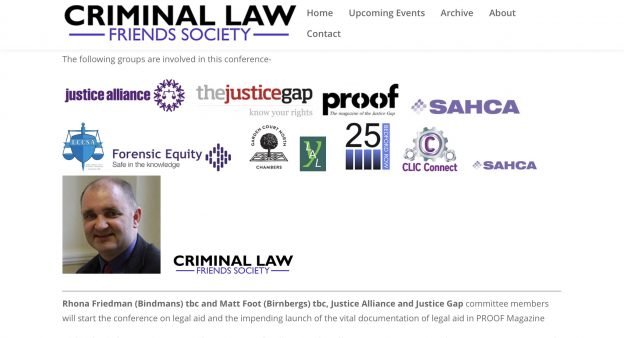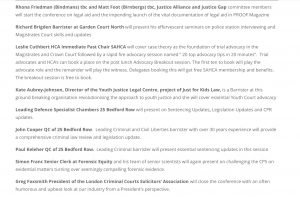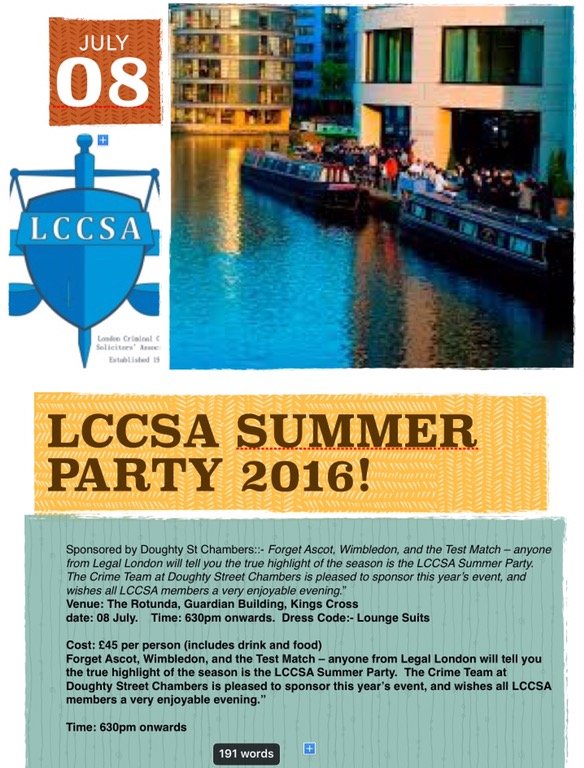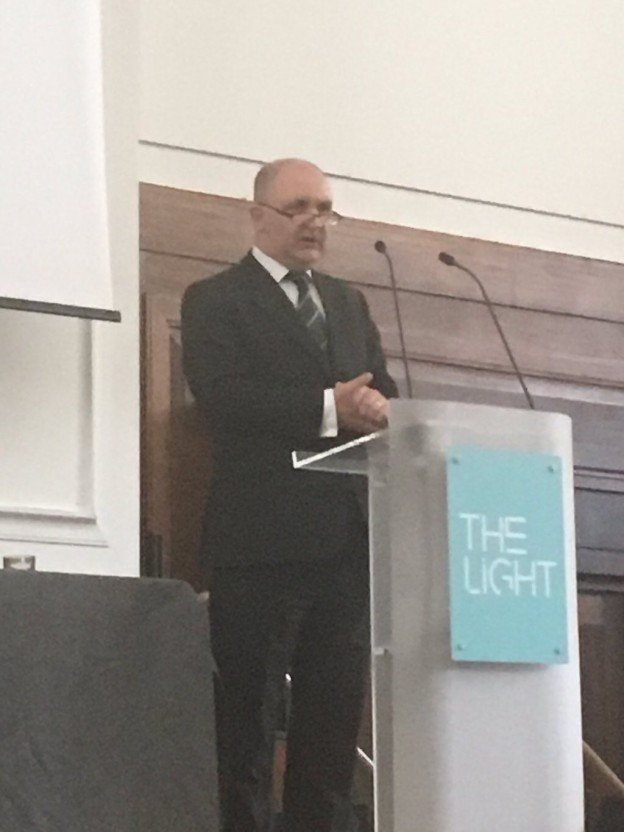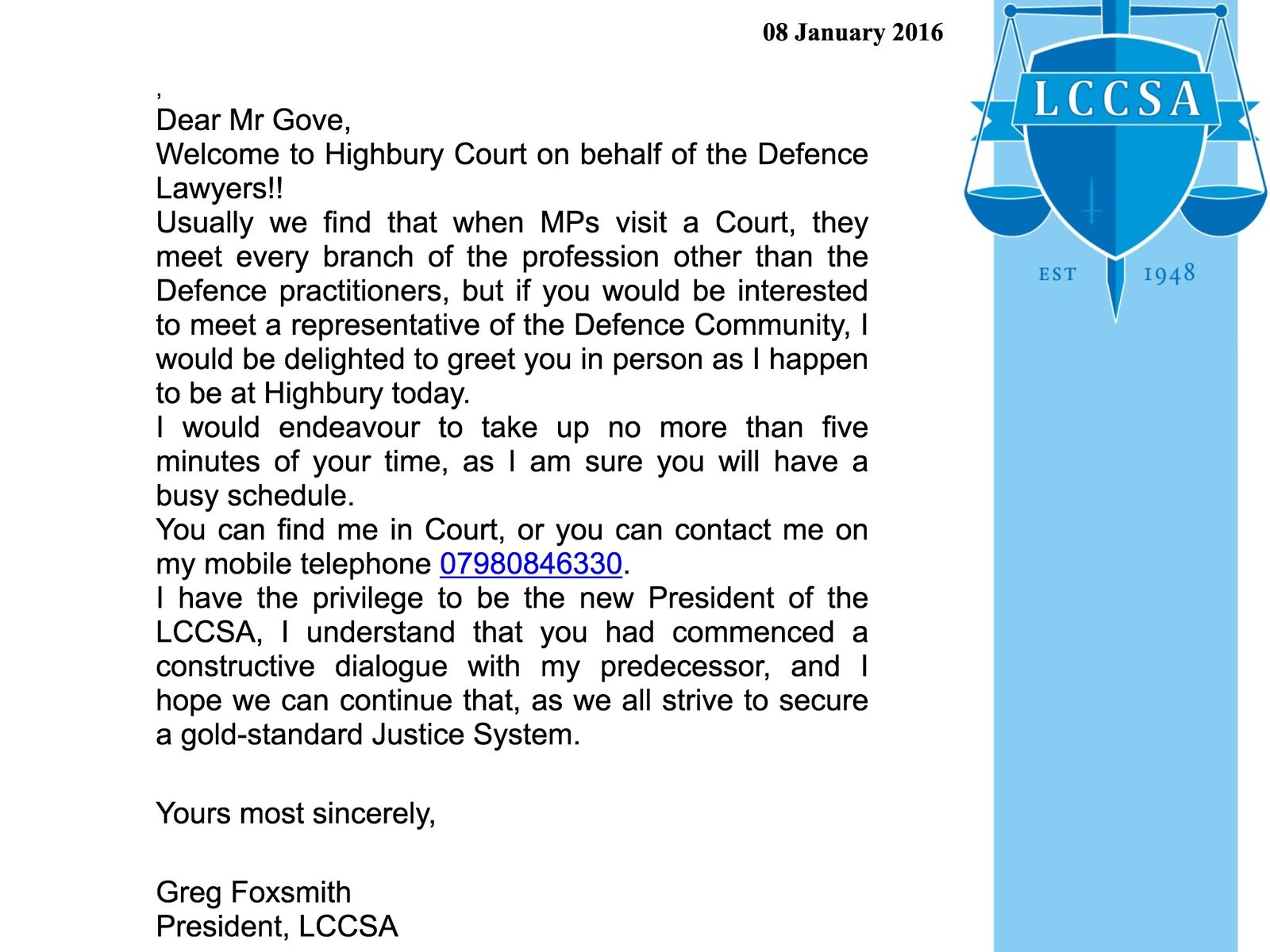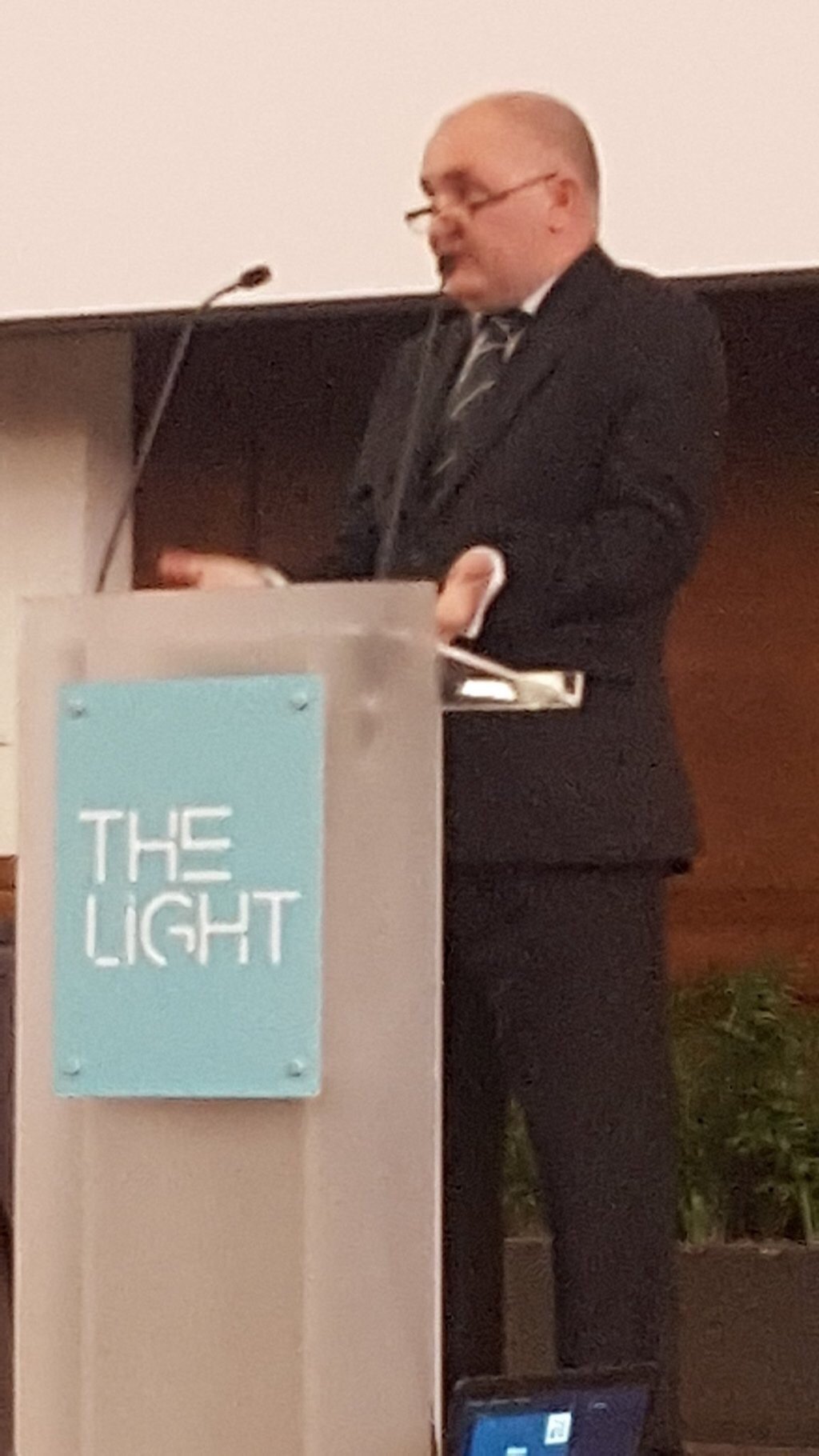I was invited (jointly with Greg Powell) to speak at this CLFS conference in the final speaker slot, on the topic of “unity, and changes ahead”
Greg Powell spoke first, lambasting the MoJ for their announcement earlier in the week that following their LGFS consultation (and despite 97% opposition) they would cap payment at 6k pages of PPE. (For non criminal legal aid lawyers, this basically is yet another cut in legal aid payments)
The text of my speech is below:–
I am now all that stands between you and the Friday evening drink, and all that stands between you and the weekend. I therefore hope to be brief.
Although probably not as much as you hope that I will be brief.
Anyway, once again I have been asked to speak on unity in the profession. This year, clearly not to be trusted I am sharing with Greg Powell, a hard act to follow.
In the programme we are billed as the “two Gregs” – like the three amigos but less fun and without the sombreros.
Or perhaps when you think of “Greggs” plural you have an image of a couple of sausage rolls.
I am no more qualified than anyone else to speak on the topic of unity.
But I suppose being involved in a rep body- in my case the LCCSA-has given me some small insight into where we, as a profession, have successfully united, and where we have not, as well as whether it matters.
I am also going to touch on breakfast Courts and the 14 hour rule for duty solicitors in the current LAA contract.
And there will be a thinly veiled appeal to join and support the LCCSA.
And in case none of that appeals I will have a go at Grayling.
Unity
Can we achieve it even between ourselves as criminal lawyers?
It’s a good topic because we have much that divides us, not least healthy competition, but it seems to me that in recent years there has been an increase in shabby gamesmanship by unscrupulous client-chasers posturing as reputable lawyers but lacking integrity.
A 1/4 century or so ago, when I was first attending courts and police stations, (back in the days when we were paid travel, waiting and a London allowance) other solicitor firms were rivals, but also friends and colleagues.
people I could approach for advice, and who would gladly provide it.
Nobody interfered with client choice or objected to a LA transfer.
Now you can go to some Courts (one in North London comes to mind) and find an army of solicitors from a rival firm armed with clipboards hovering by the door of the court or by the notice-board with list of cases, tapping up all the clients and diverting first appearances from the duty.
These are rivals but neither friends or colleagues.They are touts.
These sharp practices, whilst deplorable, probably arise from the ceaseless cuts which lead to a race to the bottom, and the less scrupulous fighting like rats in a barrel.
But ignoring that debased minority, criminal lawyers nonetheless have much in common.
The work we do, undervalued and underfunded though it is, is not merely a job, it is a profession and a vocation.
We have, I think, uniting us, an overarching interest in justice.
Of course we all have a degree of self interest, and we all would like to be well paid.
Or at least properly paid
Or sometimes even paid at all
So we are united in wanting better, and fairer, rates of pay.
We are also, I imagine, united in wanting, amongst other things:-
-Properly equipped courts with an adequate advocates room, and maybe even a cafe
-List officers that take into account advocates availability
-video-links that work,
-prisoners to arrive on time,
-competent interpreters to be booked,
-timely and adequate disclosure
and an opportunity to properly assess the evidence, give proper advice, and where appropriate prepare properly for trial including the right to challenge prosecution evidence and put forward a defence case.
We want a level playing field, we want a fair hearing.
But we also have different interests.
Big firms vs small, legal aid v private, generalist v specialist, own client vs duty, etc.
And then within law firms there are divergent interests, typically between employers (partners or co directors, firm owners) and salaried staff, or “overheads” as the former sometimes think of them.
If only there were an organisation that strives to represent all those interests, not just one vested interest group….
So what is left that may unite us?
A desire for better rates of pay
A desire that the Government may just leave us alone for a while
A wish that the LAA would go and f, f, f, fade away
Can we unite around our common interests?
How do we unite?
Firstly you need strong and accountable representative organisations.
We don’t have a trades union.
We have the Law Society, but….
Here in London you have the LCCSA .
We respond to the consultations.
We lobby.
And we reluctantly became an effective campaigning organisation
How do the LCCSA and other representative bodies work together?
Easy enough when campaigning against cuts or a Lord Chancellor so universally hated that all are joined in opposition
Remember Grayling? Whatever happened to him?
Grayling as Transport secretary
In October Grayling attending the launch of the new hybrid train between Bristol and London. A service that not only arrived into Paddington 45 minutes late after the train broke down while switching from diesel to electricity, but whose air conditioning had failed, drenching dozens of passengers with water.
As for Brexit, he says that everything will be fine because “British farmers will grow more”, a comment so facile it is beautifully eviscerated in this must-read demolition of Grayling’s ignorance which describes him as “the wilfully ignorant, insouciantly callous former Justice Secretary who took a sledgehammer to the legal aid and prison systems” (independent)
He also appeared before the Transport Select Committee, in a shambolic performance that was beautifully captured in this sketch (worth reading in full) which concludes with “while there was a refreshing honesty to his incompetence, there really didn’t seem to be any part of his brief that Grayling fully grasped. He was dangerously deluded about what had gone on on his watch and complacent about the here and now”
After CG , we had Gove, we liked him, but he didn’t last.
He did give us the Bell Committee- anyone remember that?
Gary Bell QC, the HCA hating barrister, who was to report on the CJS
His self appointed committee appears to have died a natural death
That has certainly helped unity 🙂
A year ago we had Liz Truss, lover of cheese and pork markets, who failed to stand up for the judiciary when they were attacked by the tabloids.
Now we have Lidington, beneath the radar. Not very high profile – perhaps this week’s announcement mean he is a silent assassin.
Anyway, irrespective of which Lord Chancellor we have, there are always
topics we can unite on by opposing:-
1 The announcement this week of the LGFS “restructure” (cut) which 97% of those consulted were against. Greg Powell has dealt with the absurdity of the MOJ response and this uneccessary cut. LCCSA Statement here
The Criminal Bar Association have put out a statement which “reminds the legal community and the MOJ that the system is at breaking point. There should be investment in Criminal legal aid, not cuts or reductions of any kind. We are unified with our solicitor colleagues in our aim to ensure that legal aid survives, and thrives.”
So that is unity with our friends at the bar and we thank them for it.
2 Flexible Operating Hours
The proposal came from nowhere, no consultation.
Promised it would have robust evaluation.
That evaluation went to Tender, they got that wrong, so proposals were deferred or, we hoped, died, but now they have revived the corpse.
The Breakfast court at HCMC seems to have gone, but they will be listing CPS bail trials from 5.30 pm to 8:30 pm Mon-Thursday.
Perhaps they don’t realise that Court sometimes sits that late already, with trials listed from 2-4pm. With these plans you could be there to midnight, So be ready to resist when handing in your PET forms…
Blackfriars will piloting 2 four-hour CC sessions and a half CC /half MC session (as before.)
Make sure the obvious objections are made at each stage, and this pilot will inevitably show the failings inherent in this half baked scheme.
3. 14 hours term in the new duty contracts
The duty solicitor rotas were bloated
There was a desire to remove ghosts
But what are ghosts?
We thought they were the ones on the rota who were dead retired or abroad
I’m which case a requirement to do a min amount of ps work or duty compliance would suffice
So why 14 hours p/w?!
Two examples of why this is crazy:-
1 HCAs for example do considerably more than 14 hours per week, the vast majority of which is Crown Court preparation or advocacy paid on a legal aid account under the AF1.
This is not “Contract Work” and does not therefore count. Sitting behind that advocate unpaid while they undertook the advocacy on a case would count.
The absurdity of this situation is obvious.
Equally obvious is that neither of them is remotely ghost-like. I can see no logical reason why “Contract Work” is the defining element for hours worked for the firm.
Nobody is begging to be woken up at 4am to undertake duty work but it provides clients with good quality legal advice to have people like this on the rota – this is after all the point of the duty solicitor scheme.
I cannot see the justification for disallowing this work from the 14 hours. It goes way beyond the purpose of the rule and is completely unacceptable to anyone with an ounce of common sense.
2. Child care
A DS (over 20 years call) is also a consultant and has child care responsibilities for two young but school age children. Duty work suits her well as she knows in advance when she has to be available for work and she undertakes her duty work.
She undertakes more than 14 hours a week if you do not count the weeks that she has had to be unavailable for work due to child care responsibilities, namely the school holidays. The period of review includes both Easter and the summer holidays when she was unavailable for any work at all.
When you add in those 0 hour weeks, she falls below the 14 hours and likely to be removed. Madness. And discriminatory.
It also begs the question as to how the 14 hours is calculated. Is it 14 x 52 per year – no one works 52 weeks a year – apart from probably Greg Powell. So is it 14 x 48 (4 weeks holiday) or 14 x 46 (6 weeks civil service holiday allowance)? In which case it averages over a year at less than 14 hours a week?
How did we get into this mess?
It was an LAA idea, but when canvassing representative bodies only the LCCSA objected.
For others, ghosts were not just those on the rota who never went to PS or court or undertook their duties, ghosts also included freelancers. So they supported, and still do, a requirement that solicitors work 14 hours a week and just for one firm.
The LCCSA position on 14 hours is consistent:-
In The past we have been driven into a contracting supplier base and pessimism by relentless cuts , unnecessary bureaucracy , and too often by overly hostile stances by assessors , auditors and managers .
The collapse of the scheme to contract duties passed without apology .
The LCCSA argued in relation to rules for Duty Solicitors for simplicity and an acceptable minimum standard , namely a mix of actual duties completed in court and police stations with some minimum number of overall attendances.
We argued against any hours requirement as unnecessary , bureaucratic and against the interests of working parents and especially that it offended the principles of simplicity and ease of checking .
The Present
Predictably “the Hours” will now consume much energy .All its limitations and difficulties are thrown into sharp relief as reports of overzealous interventions by account managers filter through while confusion over aspects of the schemes detail spreads .
As a membership organisation we have always fought to protect individual ownership of scheme membership .
Similarly we have favoured the widest interpretation of qualifying work and terms that allow our diverse membership to properly contribute through duty solicitor work whilst maintaining a wide variety of working lives .
The future
We will be informed by our members response .Some argue that the future should involve consolidation of the supplier Base and the concentration of ownership of duties in the hands of fewer powerful owners .This would devalue the economic positions of members of the LCCSA . It is not a position we will adopt. It is sometimes disguised as concern for the future stability of supply when it really reflects a desire to gain economic advantage.
What we always need is unity around the political issue which has been the Government desire to restrict scope and impose austerity. The hours issue is a battle for a settlement in the widest interests of members but the great issues are restoring value and scope
Well we are where we are.
What do we do about it?
Can we bring a JR ?
Well Legal Action being a last resort, we are first making representations to the LAA to soften the harsh interpretation.
We want HCA Advocacy to Count, as well as file reviews and supervision. Also:-
-Pro-rata reduction for part time workers, and for absence through illness,
-VHCC work to Count
-Hours to count whichever firm or office carried out for
Who makes these reps?
The Law Society leads.
They have a group called the ”Practitioner Group”
That includes elected bodies such as the LCCSA and CLSA
Also it includes the “Big Firms Group”
Who are the BFG ?
Nobody really knows
They don’t have a constitution
Or a website
If they have aims they are not made public
If they have a committee, we don’t know who is on it , how they were elected or even if they were elected.
They are not accountable.
We know they supported breaking the link between indiv Duty sols and their slots, putting duties in the name of the firms to distribute as they wish.
And their name suggests they focus on the interests of Big Firms, or more accurately over those that own and run them (their employee base are not consulted and do not participate)
And yet they- this self appointed group- sit at the table seeking to influence the decision makers. The two-tier contracting proposals arose from their wish to restrict the supplier base.
It is a matter of regret, that we have allowed this body to fracture Big Firms from small.
Perhaps there should also be a “Small Firms Group” and a “medium Firms Group”. There was a freelancers group, but the BFG and CLSA objected to them participating at meetings of the Practitioner Group.
Or perhaps we could just tell TLS and the MoJ to ignore the BFG, and we could all unite behind an organisation that represents big firms and small, owners, the employed and the self employed.
The LCCSA is that organisation.
The LCCSA have the following objectives,
The objects of the London Criminal Courts Solicitors’ Association are to:
▪ Encourage and maintain the highest standards of advocacy and practice in the Criminal Courts in and around London;
▪ To participate in discussions on developments in the criminal process;
▪ To represent and further the interests of the Members on any matters which may affect Solicitors who practise in the Criminal Courts; and
▪ To improve, develop and maintain the education and knowledge of those actively concerned with the Criminal Courts, including those who are in the course of their training.
So to conclude:-
The LCCSA had virtually -and by necessity- re-invented ourselves as a campaigning organisation.
We are if necessary prepared to fight again against cuts and to protect the interests of all who practice in criminal law.
Are you up for that fight?
Any representative bodies is only as strong as our membership.
We can only campaign, take legal action, put on events if our membership is strong, and we are funded by our membership fees.
If you join, or retain a membership, we are stronger.
My plea to you is, if you are not already signed up, is to join your representative body the LCCSA.
If you are a member already-thank you- and remember membership renewals are due on 1st November
Please come to our AGM Dinner on November 13th
Please consider joining the committee.
Thank you for your support.
We don’t want to do this without you, and tbh we can’t do it without you.
Join up, and we are united together.
United we stand, divided we fall.
That is the true message of Unity.
And now, time to unite and join friends and colleagues in the pub.
I hope you will raise a glass to justice, celebrate solidarity, drink to the health of legal aid, and share a toast -to Unity.
Cheers
